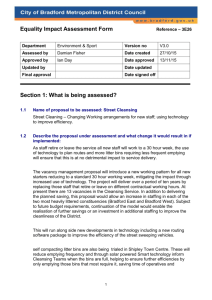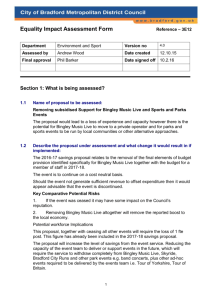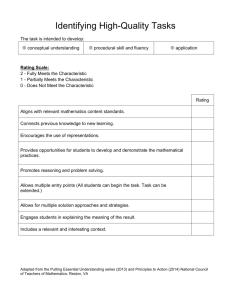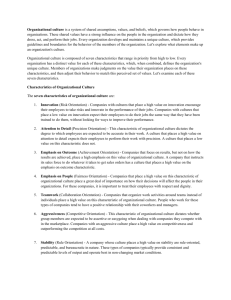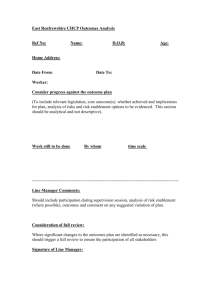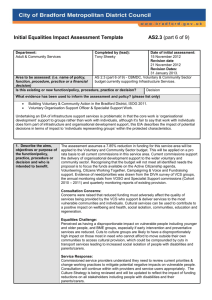Section 4: Consultation Feedback
advertisement
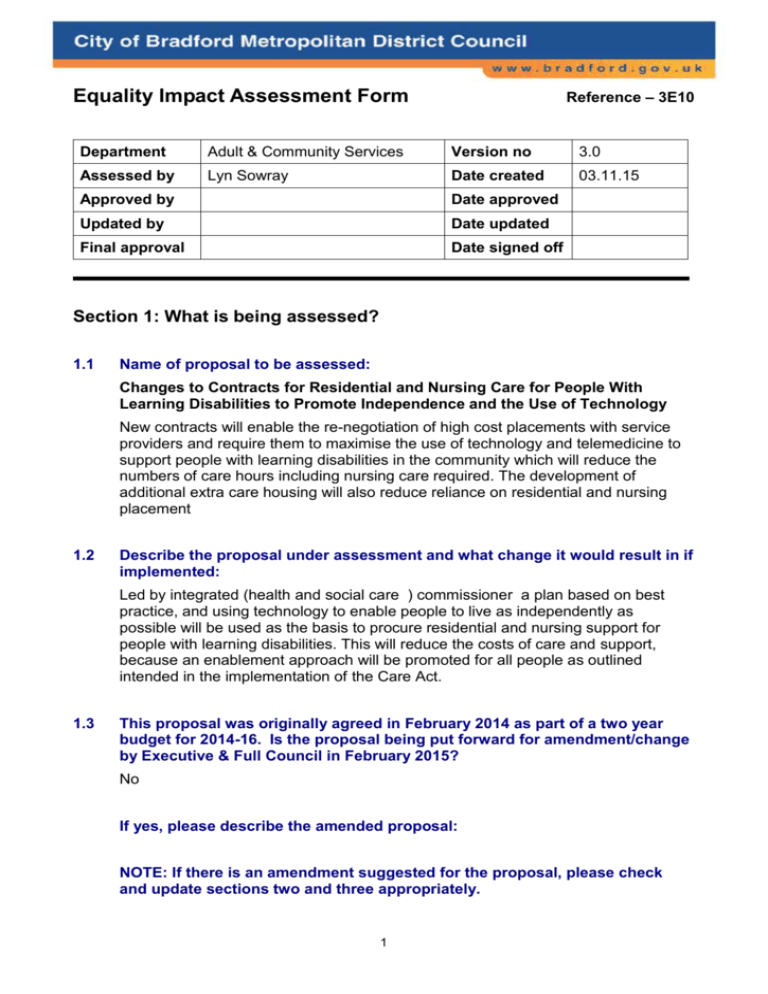
Equality Impact Assessment Form Reference – 3E10 Department Adult & Community Services Version no 3.0 Assessed by Lyn Sowray Date created 03.11.15 Approved by Date approved Updated by Date updated Final approval Date signed off Section 1: What is being assessed? 1.1 Name of proposal to be assessed: Changes to Contracts for Residential and Nursing Care for People With Learning Disabilities to Promote Independence and the Use of Technology New contracts will enable the re-negotiation of high cost placements with service providers and require them to maximise the use of technology and telemedicine to support people with learning disabilities in the community which will reduce the numbers of care hours including nursing care required. The development of additional extra care housing will also reduce reliance on residential and nursing placement 1.2 Describe the proposal under assessment and what change it would result in if implemented: Led by integrated (health and social care ) commissioner a plan based on best practice, and using technology to enable people to live as independently as possible will be used as the basis to procure residential and nursing support for people with learning disabilities. This will reduce the costs of care and support, because an enablement approach will be promoted for all people as outlined intended in the implementation of the Care Act. 1.3 This proposal was originally agreed in February 2014 as part of a two year budget for 2014-16. Is the proposal being put forward for amendment/change by Executive & Full Council in February 2015? No If yes, please describe the amended proposal: NOTE: If there is an amendment suggested for the proposal, please check and update sections two and three appropriately. 1 Section 2: What the impact of the proposal is likely to be The Equality Act 2010 requires the Council to have due regard to the need to- 2.1 eliminate unlawful discrimination, harassment and victimisation; advance equality of opportunity between different groups; and foster good relations between different groups Will this proposal advance equality of opportunity for people who share a protected characteristic and/or foster good relations between people who share a protected characteristic and those that do not? If yes, please explain further. It will promote, equality of opportunity, independence and enablement for people with a learning disability which is national policy and guidance. 2.2 Will this proposal have a positive impact and help to eliminate discrimination and harassment against, or the victimisation of people who share a protected characteristic? If yes, please explain further. No 2.3 Will this proposal potentially have a negative or disproportionate impact on people who share a protected characteristic? If yes, please explain further. People with Learning Disabilities will predominantly be affected by this proposal but the focus will be on personalised services for people so impact on protected equalities characteristics will be minimised 2.4 Please indicate the level of negative impact on each of the protected characteristics? (Please indicate high (H), medium (M), low (L), no effect (N) for each) Impact Protected Characteristics: (H, M, L, N) M Age Disability H 2 Gender reassignment N Race N Religion/Belief N Pregnancy and maternity N Sexual Orientation N Sex N Marriage and civil partnership N Additional consideration: Low income/low wage 2.5 N How could the disproportionate negative impacts be mitigated or eliminated? The Care Act (2014) requires people to have individual assessments of their needs using national eligibility criteria. The Act requires the Council to offer an independent advocate to support participation in the assessment and therefore implementation of the Act mitigates against any individual with a protective characteristic being negatively impacted. People will be individually assessed and supported to have person centred enablement plans developed with them , their advocate and family carers as outlined in national guidance. The individual assessment of the person will mitigate against any disproportionate negative impact on any person with a protective characteristic. Section 3: What evidence you have used? 3.1 What evidence do you hold to back up this assessment? Care Act (2014) implementation and performance monitoring of outcomes for people receiving services ( Adult Social Care Outcomes Framework ) 3.2 Do you need further evidence? Implementation of plans will include involvement of experts by experience including carers throughout the redesign and procurement process. 3 Section 4: Consultation Feedback 4.1 Results from any previous consultations 4.2 Your departmental feedback 4.3 Feedback from current consultation 4.4 Your departmental response to this feedback – include any changes made to the proposal as a result of the feedback 4
